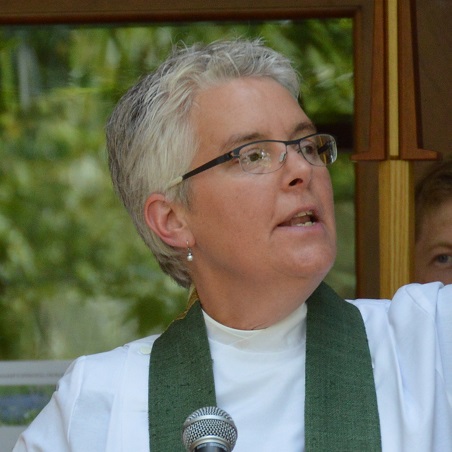Commentary on Acts 13:1-3; 14:8-18
After the dramatic coming of the Holy Spirit upon the Gentiles in Caesarea (Acts 10:1-48), and the recognition of the church in Jerusalem that “God has given even to the Gentiles the repentance that leads to life” (11:18), the mission to the Gentiles begins in earnest. The Lord announces the centrality of Saul/Paul to this mission when he is converted, saying “he is an instrument whom I have chosen to bring my name before Gentiles” (9:15), but it is only in today’s pericope that Saul, with his companion Barnabas, is formally commissioned and sent out on this mission.
The commissioning makes clear that the mission is not instigated by Saul and Barnabas. Rather, it is initiated by the Holy Spirit, who for the only time in Acts speaks directly to the church community. This commission is confirmed by the community, which listens to the Spirit and responds in faith.
The events that take place in Lystra dramatically reinforce that it is the Spirit who is guiding the fledgling church throughout the book of Acts. By the time they reach Lystra, Paul and Barnabas have created a stir in several other cities, attracting converts to the faith but also stirring up opposition among mixed crowds of Jews and Gentiles. The city they visited just before Lystra drove them out with an attempt to stone them. But here in Lystra, the first place where they encounter a purely Gentile audience, the people react differently. When they witness the miraculous healing that Paul performs, they respond with an exuberance that contrasts sharply with the resistance Paul has encountered in mixed Jewish and Gentile communities. This excitement is perilous, though, because it quickly veers into idolatry. Steeped in myths of gods taking on human form and mingling with mortals, these Gentiles assume that Paul and Barnabas must be gods, and they want to worship them and offer sacrifices to them.
Fresh from their missionary work in other cities, where they faced life-threatening resistance to the message about Jesus Christ, it could have been rather gratifying to Paul and Barnabas to be received so positively in Lystra. On the contrary, however, they are horrified. As good Jews they know that to worship anyone or anything other than God is to commit the grave sin of idolatry, to violate the First Commandment and to transgress against the fundamental truth of the relationship between the God of Israel and God’s people: that there is only one God, and the creatures God created are most emphatically not God and are not to be worshiped as gods.
This prohibition of idolatry is reinforced dramatically when the people laud King Herod and describe his speaking as “the voice of a god, and not of a mortal!” (Acts 12:22). Because Herod did not contradict them and give glory to God, “an angel of the Lord struck him down, and he was eaten by worms and died.” Likewise, in Peter’s healing of the lame man (Acts 3:1-10), which Paul’s healing in Lystra parallels, Peter asks the crowd, “why do you stare at us, as though by our own power or piety we had made him walk?” (3:12) Peter invokes the name of Jesus as that which made this man whole, a claim he repeats in front of the Council (3:16, 4:10). Later, when Cornelius the centurion falls down and worships Peter, Peter objects, saying, “Stand up; I am only a mortal” (10:26).
Paul and Barnabas without hesitation respond in the same way, emphatically insisting that they are mortals just like the people of Lystra and seizing the occasion to turn this rapturous welcome toward the one true God. Here Paul preaches his first “Gentile” sermon; whereas in the previous cities, speaking to a mingled Jewish and Gentile audience, Paul gave a recap of salvation history and relied extensively on Scripture, here in Lystra, where this history and these texts are unknown, Paul draws on what the Gentiles know. They know the goodness of the natural world, the rains and fruitfulness that gives them food and fills their hearts with joy. Now they need to understand that these gifts, and all that sustains their lives, come not from “worthless” idols but from the Creator God, the “living God” who made heaven and earth and all that is in them.
There is certainly something admirable about these people of Lystra. Unlike the crowds in previous cities, they are open to God’s visitation and receive it with excitement and joy. This response reinforces the rightness of the Spirit’s directing Paul and Barnabas toward these Gentiles and bodes well for the spread of the Gospel farther into Gentile communities. However, what is crucial is that the apostles always understand that they are not acting by their own power, but only through the infinitely greater power of the Spirit. Their mission is always really God’s mission; God called them to it, God sustains them in it, and it is God’s power that is manifest in the signs and wonders they perform. Their job is always to give glory to God, and to preach and teach in such a way that they help people of all cultures to encounter the living God, using idioms and experiences best suited to allow people to come to know God. When people in confusion start to attribute the power of the apostles’ ministry to them, the apostles must have the clarity and faith to return glory to God alone and instruct their listeners to do the same.
For those of us who preach and teach in God’s service, the lesson is the same. Proclaiming Jesus Christ does provoke resistance, and sometimes our very lives are put at risk. Since ministry can involve these challenges, it can be tempting to take whatever accolades and praise we receive as our just due, and to subtly forget whose power is sustaining our ministries. When this happens it is vital to remember what the disciples throughout Acts kept proclaiming, which was, in effect: to God alone be the glory.
PRAYER OF THE DAY
God of all, you opened your gates wide to receive all your children into the heavenly kingdom. Help us to be vehicles of promise and proclamation for all who will listen, so that every soul might live in your grace. We pray these things in the name of Jesus Christ, our Savior and Lord. Amen.
HYMNS
Signs and wonders ELW 672
When the poor ones ELW 725
Lord, dismiss us with your blessing ELW 545, H82 344, UMH 671, NCH 77
CHORAL
Because he lives, Sally DeFord


April 30, 2023